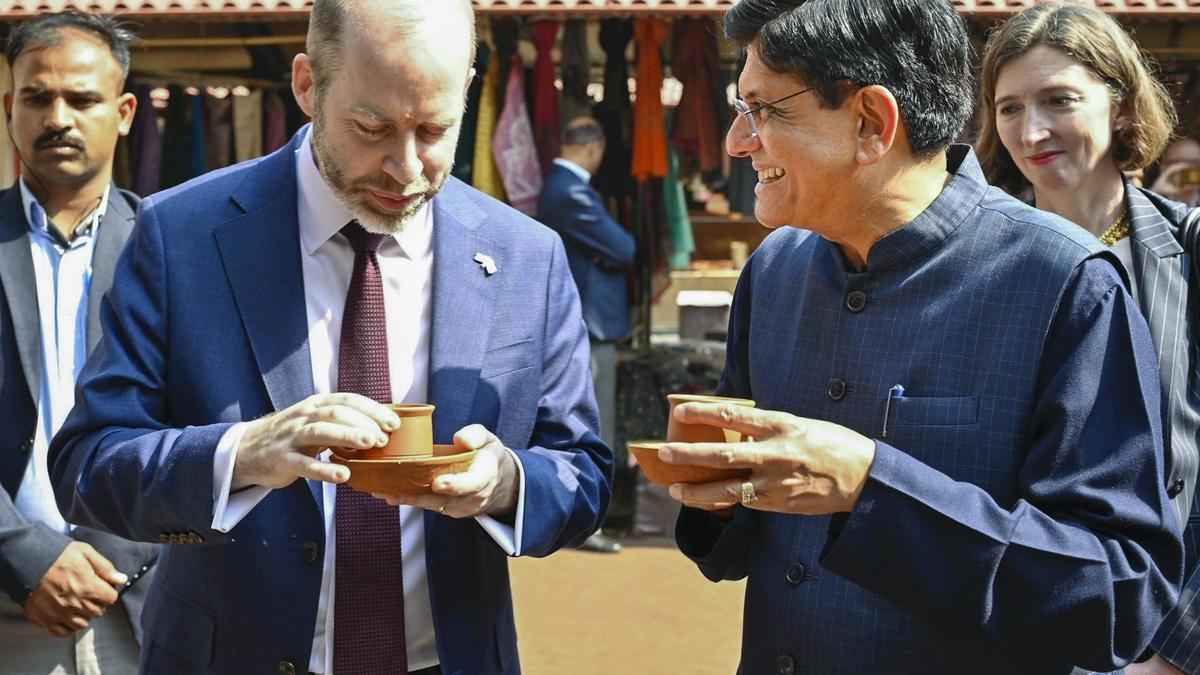India-UK Free Trade Agreement (FTA)

- 28 Feb 2025
In News:
India and the United Kingdom (UK) have resumed negotiations for a Free Trade Agreement (FTA) after an eight-month gap, with the latest round of talks marking the continuation of discussions that began in January 2022. To date, 14 rounds of talks have been held. The FTA aims to strengthen bilateral economic relations by reducing tariff and non-tariff barriers, enhancing market access, and increasing investments between the two nations.
What is a Free Trade Agreement (FTA)?
An FTA is a trade pact between two or more countries that aims to eliminate or reduce import duties on goods traded between them. It also seeks to minimize non-tariff barriers, enhance services trade, and foster investments. By reducing tariffs, FTAs make goods more competitive in foreign markets, which can help boost exports, create jobs, and enhance diplomatic ties.
India’s Trade Strategy and Focus
India has signed 13 FTAs and six preferential trade agreements with various countries and regional blocs, with a recent emphasis on Western nations, particularly the UK, the European Union (EU), and the United States (US). These agreements are part of India’s strategy to diversify its export markets, expand trade, and attract more foreign direct investment (FDI). FTAs with the UK and EU are seen as vital steps in this direction, given the opportunities they present in key sectors such as technology, healthcare, and education.
Key Objectives of the India-UK FTA
The India-UK FTA aims to:
- Boost Trade and Investment: By reducing tariffs and addressing non-tariff barriers, the FTA seeks to facilitate smoother trade between India and the UK.
- Market Access for Services: India is looking to expand its services exports, particularly in sectors like IT, healthcare, and education.
- Enhance Mobility: India aims to secure greater access for students and professionals in the UK, addressing visa and mobility challenges.
- Investment Opportunities: The agreement includes a Bilateral Investment Treaty (BIT), which will safeguard investments and create a more favorable environment for foreign investment.
Benefits of the India-UK FTA
For India, the FTA presents opportunities in both merchandise trade and services:
- Merchandise Trade: India's exports to the UK totaled $12.9 billion in FY24. The FTA is expected to provide tariff reductions on Indian goods, including textiles, apparel, footwear, cars, marine products, and agricultural exports such as grapes and mangoes. These goods currently face relatively low to moderate tariffs in the UK, and the FTA would make them even more competitive.
- Services: Indian sectors like IT, healthcare, and education are poised to benefit significantly from the FTA due to greater market access.
- Investments: The BIT will promote UK investments in India by providing a more stable and transparent investment environment, including mechanisms for dispute resolution.
For the UK, the FTA would reduce high import tariffs on certain goods, making UK products more competitive in the Indian market. Key UK exports such as automobiles, whisky, and machinery, which currently face high tariffs in India, would benefit from reduced duties.
Key Demands and Challenges
While both nations stand to gain from the FTA, several challenges and demands need to be addressed:
- India’s Demands: India seeks greater access for its students and professionals in the UK, alongside more favorable market access for key goods. It also wants to ensure that its domestic industries are protected from a surge in imports, particularly in sensitive sectors.
- UK’s Demands: The UK is pushing for significant cuts in import duties on products like scotch whisky, electric vehicles, and lamb meat. Additionally, the UK seeks improved market access for its services in India, particularly in telecommunications, legal, and financial sectors.
- Dispute Resolution: One of the key areas of negotiation is the dispute resolution mechanism in the BIT. India prefers foreign firms to exhaust local judicial remedies before seeking international arbitration, while the UK has concerns about the efficiency of India’s judicial system.
Sectoral Gains
- Technology: Both countries can collaborate on digital trade, innovation, and technology transfer, fostering mutual growth in the tech sector.
- Green Energy: The FTA could also serve as a platform for enhanced cooperation in renewable energy, aligning with both countries' commitments to climate goals.
- Education and Healthcare: Increased opportunities for educational exchanges and professional mobility in these sectors would enhance bilateral cooperation.
Way Forward
To successfully conclude the FTA, both India and the UK need to:
- Balance Tariff Reductions: Ensure that tariff reductions are fair and that sensitive domestic industries are adequately protected.
- Enhance Market Access: Address concerns related to visa and mobility, ensuring that professionals and students from both countries can benefit from easier movement.
- Finalize Investment Protections: Ensure that the BIT offers clear and mutually beneficial terms for dispute resolution and investment safeguards.
- Strengthen Sector-Specific Cooperation: Focus on areas such as technology, green energy, and digital trade to drive innovation and growth.
